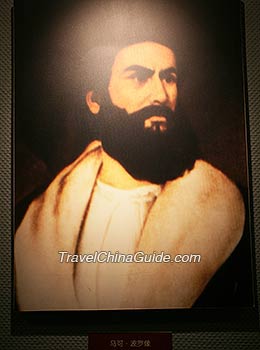 |
| Marco Polo |
Marco Polo was born in a merchant family in Venice in 1254. His father and uncle often traded into the west coast of Mediterranean Sea. On one fortuitous occasion, they went to China and met with Kublai Khan, an emperor of the Yuan Dynasty. In 1269, they returned to Venice with a letter Kublai Khan had written to Pope Clement IV. In fact, Clement IV had died the year before, and a new pope had not yet been appointed.
Young Marco Polo was very interested in listening to the stories of their travels and made up his mind to go to China.
The Long and Difficult Journey to China
In 1271, when he was 17 years old his dream came true. With a letter in reply from the new Pope Gregory X, and with valuable gifts, the Polos set out eastwards from Venice on their second trip to China. They crossed over the Mediterranean and Black Sea, passed through the land of Euphrates and Tigris Rivers, and reached the age-old city of Middle East – Baghdad. They headed south and eastwards to the prosperous seaport of Ormuz at the mouth of the Persian Gulf. From there they journeyed towards north and then east, successively crossing the desolate Iran Plateau and the snow-covered Pamirs. Overcoming the trials of illness, hunger and thirst, escaping bandits and wild animals, they finally reached Xinjiang. Marco Polo was attracted by beautiful Kashgar and Hetian famed for its jade. Then they traversed Taklimakan Desert, arrived in Dunhuang and visited the Mogao Grottoes, noted for Buddhist sculptures and frescos. They continued on their journey along the Hexi Corridor and reached Shang-du in Inner Mongolia (the summer palace of Kublai Khan) in 1275 AD. Kublai Khan gave them a hospitable reception there and took them to Dadu (now Beijing).
17-years Service in Kublai Khan's Court
Clever Marco Polo quickly learned Mongolian, Chinese and became familiar with the Chinese customs. Soon he became a confidant of Kublai Khan. He was appointed to high posts in the court and was sent on many special diplomatic missions to many places in China, India and some kingdoms of Southeast Asia, such as Vietnam, Burma and Sumatra. Astonished at the wealth of China, luxurious imperial palace and prosperous cities, he assiduously investigated the customs, geography, people and culture of all places he visited. Then he reported to Kublai Khan in detail.
17 years passed quickly and Marco Polo missed his hometown more and more.
Come Home and the Travels of Marco Polo
In 1292, Kublai Khan agreed to let Marco Polo, his father and uncle return home, after they convoyed a Mongolian princess Kokachin to marry a Persian king. In 1295, they finally reached Venice by sea via the Black Sea and Constantinople. The information about China and some Asian states they brought back, aroused great interest among the Venetians. In 1298 AD, Marco Polo joined in the war between Venice and Genoa. Unfortunately he was captured and put into a Genoese prison, where he met a writer, Rustichello da Pisa. The writer recorded the story of his travels, well-known as The Travels of Marco Polo. The book has detailed descriptions of the wealth of China, a Japan filled with gold, and the exotic custom of Central Asia, West Asia and Southeast Asia soon made it a bestseller.
Afterwards, the book became very popular in Europe and paved the way for the arrivals of countless westerners in the following centuries.


 Copyright © 1998-2012 TravelChinaGuide.com, All rights reserved.
Copyright © 1998-2012 TravelChinaGuide.com, All rights reserved.